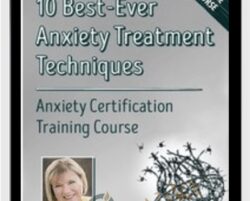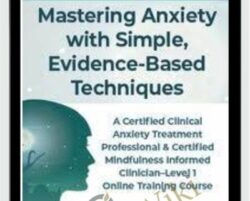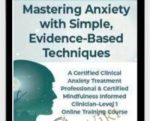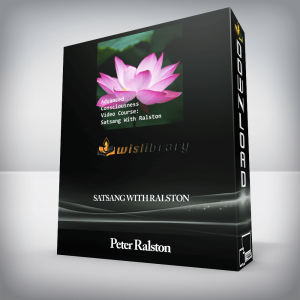Master the foundational anxiety treatment techniques that make therapy modalities like CBT, DBT, ACT and somatic therapies so successful…And earn DOUBLE certification in anxiety treatment and mindfulness-informed therapy—all in one self-paced online courseYou’ve heard about the power of mindful awareness for treating anxiety. Now, discover how to apply it in therapy in an individualized way that helps clients immediately see the positive impact on their symptoms, and their lives.Treating anxiety with mindfulness tools is NOT about trying to change problematic behavior. It’s about strengthening the neural pathways that promote positive emotions, focused attention, and self-compassion. The desired behavior follows.When you give your clients mindfulness exercises to practice between sessions, you give them the tools to:Activate the insula region of the brain so they can control shallow breathing, tightening muscles, and other physical symptoms of anxiety…Shrink their amygdala to lessen fear and anxious arousal, andIncrease frontal cortex activity (emotional self-regulation) so they can more easily manage worrying thoughts and feelings.The best part? When you change the brain, new habits and positive behaviors stick way better than trying to muscle through cognitive behavioral changes on willpower alone…Making mindfulness techniques the perfect complement to your practice.Enroll in this online certification training course today to discover how to use dozens of customizable mindfulness tools that help each of your clients reduce anxiety quickly, and for good.DOUBLE CERTIFICATION BONUS!Certification in today’s evidence-based approaches shows colleagues your expertise in anxiety treatment. Your specialized credentials attract clients because they see you as the therapist who has the skills to help them find the relief they’re so desperately seeking.And, when you complete this course, we’ll cover the initial cost of both certifications. Become a Certified Clinical Anxiety Treatment Professional (CCATP) & Certified Mindfulness Informed Clinician–Level 1 (CMC-1)Benefits of DOUBLE CertificationClinical expertise: Show clients and colleagues your practice is based on leading-edge research in this complex area of mental health.Client trust: Certification shows your clients you care about providing the best care possible. It reveals your professional ability to take on challenging clients and succeed!Documentation of knowledge: Certification is both a professional and personal accomplishment. It’s an unbiased barometer of your training and dedication to your practice.Improved insurance reimbursements: Receive more favorable consideration from insurance companies and managed care panels.Professional recognition: Set yourself apart from the thousands of clinicians relying on outdated methods to treat their clients. Increase your opportunities for career advancement and client referrals.WHAT YOU’LL FIND IN THIS COURSEPart I | Certified Clinical Anxiety Professional (CCATP) Certification TrainingThis part of the course provides all the training you need to become a CCATP and enhance your practice.Section I | Rewire the Anxious Brain: Neuroscience-Informed Treatment of Anxiety, Panic and WorryDr. Janene M. Donarski integrates brain-based strategies for calming the anxious mind that motivate lasting change in your clients. Her approach also promotes adherence to treatment and strengthens the therapeutic alliance.Using Neuroscience in the Treatment of AnxietyWhat we know about anxiety-based disordersScientific explanations, evidence, authority that destigmatize difficultiesHelping clients take responsibility for their well-beingEnhancing Engagement in TreatmentDon’t neglect the therapeutic relationship!Address the challenges of anxious clientsGuide the process using client’s goalsHow to maintain motivationNeuroplasticityDefine Neuroplasticity in everyday languageTherapy is about creating a new self“Rewiring” as an accessible concept for changeRe-consolidation: the modification of emotional memoriesIdentify Two Neural Pathways to AnxietyAmygdala – bottom-up triggering of emotion, physicality of anxietyCortex – top-down emotion generation based in cognitionHow anxiety is initiated in each pathway and how pathways influence each otherClient Friendly ExplanationsFight/flight/freeze responsesThe “language of the amygdala”Anxiety and the cortexHelp clients recognize the two pathways to anxietyNeuroplasticity in the AmygdalaBreathing techniques to reduce activationExposure as opportunities for the amygdala to learnCombatting avoidancePush through anxiety to change the amygdalaNeuroplasticity in the CortexThe healthy (adaptive) use of worry in the cortexRecognize and modify the impact of uncertaintyLeft hemisphere techniques – cognitive defusion, coping thoughts, fighting anticipationRight hemisphere techniques – imagery, musicNeuroplasticity and Medications for Anxiety Disorders, OCD, PTSD, DepressionThe myth of the chemical imbalanceThe danger of sedating the brain with benzodiazepinesPromoting neuroplasticity with SSRIs, SNRIsThe effectiveness of CBT and medsMoving Beyond Diagnostic Categories to Focus on Anxiety PathwaysAnxiety is a component of many diagnosesAmygdala – and cortex-based techniques help in other disordersTargeting brain-based symptoms rather than disordersWorry, obsessions, rumination respond to similar cortex-based techniquesPanic, phobic responses, and compulsions respond to amygdala-based techniquesResearch, Risks and LimitationsEmpirical versus clinical and anecdotal evidenceClinical considerations for specific clients and settingsEfficacy of particular interventions may varySection II | Ten Best-Ever Anxiety Treatment TechniquesMethods that control physiology, reduce tension, and offset panic or acute anxiety can be simple to learn but challenging to apply. Bestselling author and anxiety expert Dr. Margaret Wehrenberg gives you a complete set of tools proven to reduce anxiety:Assessment and Differential DiagnosisThe causes of panic, generalized anxiety and social anxiety that help select treatmentDifferential diagnosis in children – ADD and ASDTreatment approaches that change brain function for long-lasting recoveryThe impact of insomnia in generalized anxietyTechniques That Work to Modulate PhysiologyThe right way to teach and use diaphragmatic breathingDevelop the 4 competencies of stress managementUtilize different types of relaxation and discuss their use in different types of anxiety disordersFour important lifestyle changes everyone can make to reduce anxietyTechniques for Treating Cognitive Problems of Anxiety and PanicThe best thought-replacement methods for worry and ruminationClear the mind of ruminative and racing thoughtsKnow when anger triggers anxiety and how to work with it in worried clientsHow to stop worry before it happensTechniques for Managing Social AnxietyApply the “Three Deep Breaths and Good Preparation” model to construct treatment goals for social anxietyStructure cognitive change through planned “counter-cognitions”Apply ‘in vivo exposure’ techniques that optimize recovery from social anxietyLimitations of the Research and Potential RisksControlled studies on the human brain structure and function are limited by challenges of studying the brain in actionNew studies continually modify our understanding of how neurotransmitters interact and affect cognition, emotion and behaviorThere are no significant risks associated with Cognitive-Behavioral TherapyAssessment of an individual’s capacity to understand and utilize an intervention should always precede employment of the techniquePart II | Certified Mindfulness-Informed Clinician-Level 1 (CMC-1) TrainingImmerse yourself in Deb Alvis’s flagship, in-depth training into mindfulness tools that have been proven to change neural pathways so clients can reduce their symptoms of anxiety for good. This part provides all the training you need to become a CMC-1 and enhance your practice.Mindfulness and the ClinicianEmpirical support for improved symptomology and well-beingThe latest research on therapists who practice mindfulnessYour mindfulness practice and how you can embody mindfulnessSituations that may contraindicate applying mindfulness in sessionMindfulness Psychoeducation Approaches to Enhance Motivation in TherapyMindfulness vocabularyVisuals and metaphors to explain mindfulnessMotivate clients with neuroplasticityDeepen the Therapeutic Relationship by Building Presence, Trust and Empathetic Connection with ClientsOvercoming barriersAffect regulation techniques for therapist and clientStrategies to create empathetic connectionExercises to build clients trust in themselvesTeaching Mindfulness to ClientsTips for teaching clients about the senses and awarenessStrategies to shift from “Automatic Pilot”Skill building interventions to increase responsiveness & reduce reactivityHow to adapt practices to special populationsAnxiety and StressBreathing practices that break the rumination cycleMovement strategiesMulti-sensory regulation techniquesMindfully reduce the intensity of panic attacksMindfulness for TraumaExercises to counter fight or flightGuided meditations to disempower intrusive thoughtsGrounding exercises and sample scriptsUsing Mindfulness in Depression TreatmentRecognize self-criticism and respond with self-loveManage negative self-talk with awareness of thoughtsMeditations to boost well-beingMindfulness for AddictionsAwareness vs. autopilot — relapse preventionMindfulness for triggersEmotional regulation for cravingsPractices to break the habit loopMindful AngerBreathe through angerDistraction and grounding techniquesSelf-soothing techniquesMindfulness, Diversity, & Cultural HumilityAdapt mindfulness experiences with cultural sensitivityAssess appropriateness of mindfulness interventions for individualsNegotiate the treatment planMindfully Conquer Compassion FatigueRight here/right now – stay in the moment to reduce anxietiesEffective and healthy ways to manage your emotionsChange limiting stories about caring for yourselfRelease the negative – 3 steps to countering negativity biasGet Mastering Anxiety with Simple, Evidence-Based Techniques – Debra Alvis & Margaret Wehrenberg, Only Price $859Tag: Mastering Anxiety with Simple, Evidence-Based Techniques – Debra Alvis & Margaret Wehrenberg Review. Mastering Anxiety with Simple, Evidence-Based Techniques – Debra Alvis & Margaret Wehrenberg download. Mastering Anxiety with Simple, Evidence-Based Techniques – Debra Alvis & Margaret Wehrenberg discount.
 Forex Swing Trade: Get Swing Trading Strategy to Be Trader – Thomas Boleto
₹7,138.00
Forex Swing Trade: Get Swing Trading Strategy to Be Trader – Thomas Boleto
₹7,138.00
 10 Best-Ever Anxiety Treatment Techniques: Anxiety Certification Training Course – Margaret Wehrenberg
₹30,378.00
10 Best-Ever Anxiety Treatment Techniques: Anxiety Certification Training Course – Margaret Wehrenberg
₹30,378.00
Mastering Anxiety with Simple, Evidence-Based Techniques – Debra Alvis & Margaret Wehrenberg
₹41,002.00




